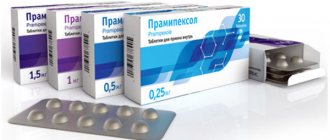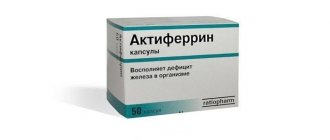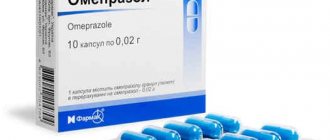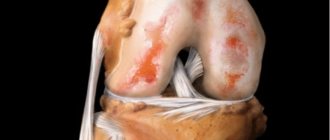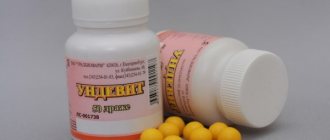Release form and composition
Phlebodia 600 is available in the form of film-coated tablets: round, biconvex, pink (in blister packs: 15 pcs., 1, 2, 4 or 6 packs in a cardboard pack; 18 pcs., 1 pack in a cardboard pack ).
1 tablet contains:
- active ingredient: diosmin – 600 mg (in terms of dry matter);
- excipients: colloidal silicon dioxide, stearic acid, microcrystalline cellulose, talc;
- film shell: Sepifilm 002 [hypromellose (E464), microcrystalline cellulose, macrogol 8 stearate type 1], Sepispers AP 5523 pink [titanium dioxide (E171), hypromellose (E464), crimson dye - Ponceau 4R (E124), red iron oxide ( E172), iron oxide black (E172), propylene glycol (traces)], Opaglos 6000 [beeswax (E901), carnauba wax (E903), shellac (E904), ethanol 95° (traces)].
Composition of the drug
The medical product contains granulated diosmin, which is the main active element and corresponds to purified anhydrous diosmin (dosage - 600 mg). Contraindications to Phlebodia 600 are described in detail in the instructions.
The auxiliary components of this medicinal product are:
- colloidal silicon dioxide;
- talc;
- stearic acid;
- dye mixture – titanium dioxide, ponceau 4R (cochineal red), propylene glycol, iron oxide (black and red);
- microcrystalline cellulose;
- opaglos 6000 – beeswax and palm wax, 95% ethanol, gummilac.
The protective film covering the tablet consists of:
- microcrystalline cellulose;
- hypromellose;
- polyethylene glycol stearate 400.
Before talking about contraindications to Phlebodia 600, let's consider the pharmacological properties.
Pharmacological properties
Pharmacodynamics
Phlebodia 600 is a venotonic drug with the active ingredient diosmin, which has venoprotective, phlebotonic and anti-inflammatory effects.
The phlebotonic activity of diosmin is manifested by an increase in the tone of the veins, a decrease in their distensibility and venous stagnation. The drug helps improve lymphatic drainage by increasing the tone and frequency of contraction of lymphatic capillaries, increasing their functional density, and reducing lymphatic pressure. Against the background of a decrease in capillary permeability and a dose-dependent increase in their resistance, microcirculation improves.
It has an effect on leukocytes, reducing their adhesion to the venous wall and migration into paravenous tissue. Improves oxygen diffusion and perfusion in skin tissue. Blocks the production of free radicals, the synthesis of thromboxane and prostaglandins.
Strengthens the vasoconstrictor effect of adrenaline and norepinephrine.
Pharmacokinetics
After oral administration, diosmin is rapidly absorbed from the gastrointestinal tract. It is detected in plasma after 2 hours, and reaches its maximum concentration (Cmax) in the blood after 5 hours.
Due to the property of selective accumulation, uniform distribution and accumulation of diosmin and/or its metabolites is observed to a greater extent in all layers of the wall of the vena cava and saphenous veins of the lower extremities. In venous vessels, its Cmax is reached 9 hours after administration and persists for 96 hours. It enters the tissues of the kidneys, liver, lungs and other organs in small quantities.
It is excreted primarily through the kidneys - up to 79%, the rest - through the intestines.
What else should you consider?
In addition, it should be noted that the drug “Phlebodia” actively affects some components of a biological nature:
- prevents the release of prostaglandins, free radicals and thromboxanes into the blood;
- enhances the vasoconstrictor properties of adrenaline and norepinephrine;
- reduces the number of free superoxide anions;
- reduces the adhesion of leukocytes to the wall of the venous bed;
- reduces redistribution migrations of white blood cells into paravenous tissue.
We will talk about contraindications to Phlebodia and side effects below.
Instructions for use Phlebodia 600: method and dosage
Phlebodia 600 tablets are taken orally.
The drug should be taken after consulting a doctor.
Recommended dosage:
- varicose veins of the lower extremities, chronic lymphovenous insufficiency (pain, swelling, cramps): on an empty stomach, in the morning - 1 pc. 1 per day. Course duration – 60 days;
- exacerbation of hemorrhoids: during meals - 1 pc. 2-3 times a day for 7 days.
If you accidentally miss the next dose, treatment should be continued at the usual dosage regimen.
Pharmacokinetics and pharmacodynamics
The drug is quickly absorbed from the digestive tract (oral administration). Its active substance is detected in plasma after two hours, and the maximum level in the blood is observed five hours after administration.
Diosmin is deposited evenly - this occurs both in the vena cava and in the vascular bed of the extremities and other tissues of the body. Active elements are excreted primarily by the kidneys (approximately 80% of a single dose), to a lesser extent through the intestines (about 11%) and through bile (2.4%).
special instructions
In the absence of a rapid clinical effect in the treatment of an acute attack of hemorrhoids, additional examination and correction of the ongoing complex therapy are required.
If symptoms of adverse events appear or worsen, it is recommended to consult your doctor.
Impact on the ability to drive vehicles and complex mechanisms
Taking Phlebodia 600 tablets does not affect the patient’s ability to drive vehicles and complex machinery.
Contraindications to Phlebodia
The pharmacological agent is contraindicated for use in patients who have the following pathological or physiological conditions:
- Intolerance to substances present in the composition.
- Hereditary idiosyncrasy or hypersensitivity to components.
- Also, the lactation period should be considered a contraindication to the use of Phlebodia.
- Age less than 18 years.
All this must be taken into account before making an appointment.
Reviews about Phlebodia 600
Reviews of Phlebodia 600 are positive. The effectiveness of the tablets is confirmed by patients and doctors. In the treatment of hemorrhoids, taking the drug allows you to relatively quickly, in a conservative manner, stop the inflammation of severe forms of hemorrhoidal cavities and weaken the impact of acute crises.
Women with chronic lymphovenous insufficiency note that the use of diosmin during pregnancy relieves the discomfort that usually accompanies venous stagnation and greatly facilitates the physiological bearing of a child.
Reviews from doctors indicate such advantages of the drug as the rapid onset of the therapeutic effect and a very low probability of developing unwanted reactions.
Indications for use
We’ll look into the contraindications and side effects of Phlebodia later, but for now let’s talk about the indications. The drug can be prescribed to patients as monotherapy or as part of a combination treatment, together with other medications, when the following pathological conditions occur:
- chronic venous insufficiency;
- feeling of heaviness in the limbs, especially in the evening;
- varicose transformation of the veins of the lower extremities located subcutaneously;
- the initial stages of the development of hemorrhoids, pain in the rectum, as well as hemorrhoidal crisis;
- treatment and prevention of disorders of the functioning of the lymphatic bed;
- burning and fatigue in the lower extremities while in a horizontal position;
- increased fragility of capillary vessels;
- various disorders of blood microcirculation.
Reviews
Reviews of the drug in the treatment of hemorrhoids confirm the effectiveness of its pharmacological properties. The pathophysiological effect of the drug in a relatively short time makes it possible to treat inflammation of hemorrhoidal cavities in a conservative way, even at advanced stages of the pathology. In addition, the tablets help soften the course of acute crises, which has a very positive effect on the general condition of patients.
Expectant mothers who were treated for lymphovenous insufficiency during pregnancy were also completely satisfied with the effect of this pharmacological drug. Phlebodia tablets, according to them, allow you to get rid of the discomfort and unpleasant sensations that accompany stagnation of blood and lymph in the extremities, which significantly facilitates the course of pregnancy. Separately, it should be noted that due to the increased blood supply to the skin and the pronounced venotonic effect, the drug “Phlebodia” helps to provide cosmetic effects.
People suffering from varicose veins also left many positive reviews about this medicine. They note that the veins affected by the pathological process began to hurt less, the swelling of the legs and the feeling of fatigue decreased.
Reviews from medical specialists who use the drug in their practice characterize this drug on the good side, since the pharmacological effect it provides occurs quite quickly. The main thing is to take into account the contraindications of Phlebodia.
As for the side effects that may occur during treatment with this drug, the reviews note that the tablets are easily tolerated by the body and practically do not provoke the development of adverse events. Despite this, some few patients experienced mild digestive disorders, attacks of dyspepsia, and changes in stool consistency. Most of these symptoms were short-lived and disappeared on their own.
Analogs
Angioprotectors are a category of pharmacological agents, the effect of which is aimed at strengthening the walls of the bloodstream, preventing the development of vascular insufficiency and stagnation of blood in the veins, pathophysiological effects on the vessels of the lymphatic system and biologically active elements that regulate these indicators.
Thus, in addition to the drug “Phlebodia”, the following medications are widely used:
- “Vazoket” is a medication based on diosmin, which has a venotonic effect (reduces the distensibility of veins), increases the tone of the veins (with a dose-dependent effect), reduces the level of venous stagnation, improves lymphatic drainage (increases the tone of lymphatic capillaries, increases their functional density, blocks lymphatic pressure) , normalizes microcirculation, reduces the adhesion of leukocytes to the venous walls and their migration into paravenous tissue, and has anti-inflammatory properties.
- "Diovenor" is a medicine whose effect is expressed in increasing vascular resistance and resistance of venous tone and capillaries, eliminating capillary permeability and venous stagnation, as well as enhancing lymphatic drainage. This medication is used for varicose veins and insufficiency of the body's vascular system.
- "Detralex" is an analogue of the drug "Phlebodia". Which, in addition to diosmin, contains another active element - hesperidin. This medicine has angioprotective and venotonic effects. The drug reduces the distensibility of veins, eliminates blood stagnation in them, and capillary permeability.
Side effects
If you do not take into account contraindications to Phlebodia, there is a high risk of developing side effects. In most cases, the tablets are well tolerated by patients, showing maximum therapeutic results without significant side effects. However, the following adverse reactions have been described in clinical medical practice:
- dyspepsia (nausea, vomiting, pain in the upper abdomen, bad breath);
- dizziness, headaches;
- manifestations of allergies (rashes on the skin, itching, angioedema, etc.).
Such negative reactions of the body, as a rule, do not require therapy and disappear on their own after a short break in conservative treatment. It is better to get a complete picture of the contraindications and side effects of Phlebodia 600.
Use during pregnancy
What do you need to know about the indications for use and contraindications of Phlebodia regarding use in pregnant women?
This drug has been included in numerous teratogenicity studies, and they showed negative results. Thus, no negative effect on the developing fetus was identified. However, in order to avoid unwanted reactions or accidental involution, the therapeutic course is prescribed only after the end of the first trimester of pregnancy.
Instructions for use
Tablets of this medication are taken orally. Reception does not depend on meals, periods of wakefulness and physical activity. The treatment regimen should be prescribed individually by the attending physician, but in most cases it follows one of several of the most effective methods.
If the medication is prescribed for the treatment of varicose veins or insufficiency of chronic venous structures, then the daily dosage of this medication is 1 tablet. The course of taking the drug depends on the pathophysiological stage of the pathology: at the initial stages of development it is necessary to take tablets for 2 months, and at later stages - 3-4 months. If trophic changes occur on the skin (necrotic ulcers as the last stage of development of the pathological process), the course is extended to six months.
Instructions for taking the drug "Phlebodia" during exacerbation of hemorrhoidal inflammation of the rectal area involve prescribing the drug 2-3 tablets per day in order to relieve acute conditions. Further, if necessary, the course is extended with one tablet per day for 2-3 months.
During the 2nd and 3rd trimesters of pregnancy, this medication helps get rid of lymphovenous insufficiency, which occurs chronically, if you take the tablet once a day. It is recommended to take the therapeutic course under the supervision of a qualified specialist, that is, during inpatient therapy. It is necessary to stop sanitation 2-3 weeks before birth, which should be reported to the attending physician, as well as contraindications and side effects of Phlebodia 600. You should read reviews about the drug in advance.
